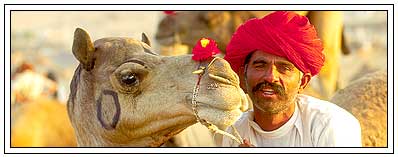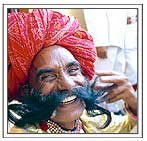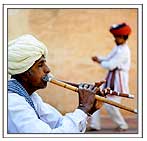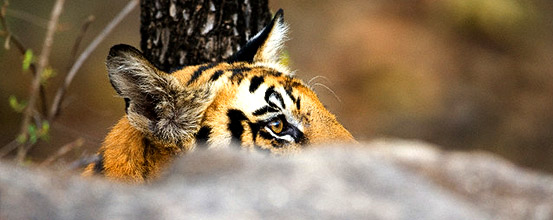Cultural Rajasthan Tour
Duration : 11 Nights / 12 Days
Destinations Covered : Delhi - Mandawa - Bikaner - Jaisalmer -
Jodhpur - Luni - Udaipur - Ajmer - Jaipur - Fatehpur Sikri - Agra - Delhi

Day - 1 Arrive Delhi & Drive to Mandawa (263Kms/164Miles)
Arrive Delhi by flight at 0915hours. Delhi is the capital
of India and the third largest city of India. Delhi and Mumbai are the main
cities used for international travel. You can even call Delhi twin cities-Old
Delhi and New Delhi. Old Delhi was the capital of India during the Muslim rule
from the 12th to the 19th century. New Delhi was created later under the British
imperial rule. But what a travel book cannot tell you is that Delhi is a kaleidoscope
that promises everything for a tourist, historic sites, divine retreats, heritage,
tourism, theme parks, museums, gardens, galleries, film festivals, great shopping
and more. You will be met on arrival by our representative.
Welcome by fresh flower garlands at the airport. Leave
straight from the airport for Mandawa by air-conditioned coach. En route
you will make a stop at a Midway restaurant for Tea/Coffee etc. You can
also use the wash room here. Mandawa. Spread over Jhunjhunu, Sikar and
Churu districts in north western Rajasthan, Shekhawati region is known for
its beautifully painted havelis (merchant’s houses), found in nearly
20 towns and villages. Mandawa is one of them. Besides the cenotaphs,
wells, forts and temples, the majority of frescoes are painted on the
walls and gateways of havelis. The Shekhawati paintings mainly consisted
of red, green, yellow, brown, blue and mushroom colours. Mandawa was
founded in the early 18 th century, and is dominated by a rugged fort (now
a hotel). Lunch in the midway restaurant.
Arrive Mandawa and check in at HOTEL MANDAWA CASTLE Later
you will visit the town and its painted Havelis. Dinner and overnight at
the hotel.
Day - 2 Mandawa - Bikaner (270 Km/169Miles)
Breakfast at the hotel. Leave Mandawa for Bikaner by
air-conditioned coach. Bikaner was a bustling trade centre in the
yesteryears and figured on the caravan routes from Africa to Asia. The
walled city of Bikaner stands on the northern tip of the desert triangle.
It is situated on elevated ground, surrounded by a 7km long embattled high
wall. Monuments here are chisled out of red and yellow sandstone and
display some of the finest characteristics of the Rajput civilisation.
Bikaner boasts a spectacular fort and an old city dotted with havelis, and
colurful bazaars.
Arrive Bikaner and check in at THE HERITAGE RESORT. This Afternoon
you will be given the Sightseeing tour of Bikaner, with a visit to the 16th-century
fort, a byzantine complex of palaces, pavilions, and temples connected by paved
courtyards, narrow staircases, and terraces. You will also have the opportunity
to visit the Camel breeding farm. Dinner and overnight at the hotel.

Day - 3 Bikaner - Jodhpur - Luni (280 km/175Miles)
Breakfast at the hotel. After breakfast leave Bikaner
for Luni. Enroute you will be given the city tour of Jodhpur (245 Kms from
Bikaner) Lunch at one of the hotels in Jodhpur. The Jodhpur city has a
history of battles and royalty as is highly evident by the huge
Meherangarh fort overlooking the city. There are some old monuments to see
here and you can make a stop before heading to other places in Rajasthan.
Did you know that the famous baggy/tight riding trousers called Jodhpuris
take their name from this city.
The city which stands at the edge of the Thar desert, was
founded by Rao Jodha, a chief of the Rajput clan known as Rathores in 1459
City tour of Jodhpur - the largest city in Rajasthan after Jaipur, Jodhpur
stands at the edge of the Thar Desert. It was founded by Rao Jodha. Chief
of the Rajput clan known as Rathores and the Rathore kingdom was once
known as Marwar - the Land of Death. The tour includes Meherangarh Fort -
one of the most impressive & formidable in the whole of fort-studded
Rajasthan is situated on a high natural rock bluff and from which you can
look down on the wonderful panorama of the bustling city below, Jaswant
Thada - the Royal Cenotaphs. The Jeeps will wait for you for a visit to
Bisnoi Village. Visit the surrounding villages and witness their daily
lifestyle of living. You will also be able to visit some of the houses and
enjoy cup of tea / coffee with them. By the same Jeeps, you will proceed
to Luni. The coach will reach Luni ahead of you. Luni - The village
nestles in the shadow of the fort Chanwa walls. At night all is quiet in
Luni village and the fort, with its huge gates and protective walls stands
proud and strong under the spectacular canopy of stars. Peace spreads out
across the desert past the near by Luni river bed and to the city of
Jodhpur 35 kms away.
Arrive Luni and check in at the HOTEL FORT CHANWA. Fort
Chanwa of Luni is an exceptional example of Elegance and Symmetry in
Indian architecture of the last century. The entire fortress is carved out
of the famous red sandstone of Jodhpur and with its ornately carved
lattice work friezes and intricate Jherokas it exquisitely captures the
romance and grace of a bygone age. Dinner and overnight at the hotel.
Day - 4 Luni - Udaipur (240 km/150Miles)
Breakfast at hotel. Later leave Luni for Udaipur by
air-conditioned coach. Udaipur is the most romantic of all the Rajasthan
cities and one of the most exotic places in Asia. The city's palaces,
havelis, temples sets it apart from the rest of the cities. It is also
popular for its crafts, paintings and performing arts. The lake palace is
the best example of the unique cultural explosion. Udaipur has rightly
been called Venice of the east. You can see the city from the rooftop of
palaces, the view is marvelous, it makes you forget the world. The smooth
rolling hills that surround Udaipur are as overpowering as the city
itself. Enroute visit Ranakpur temples.
Cradled in a verdant valley in the valley in the Aravalli
Hills, on the banks of the river Maghai, stands one of the five holiest
places of the Jain faith, 15th century Ranakpur. Just 96 km from Udaipur,
Ranakpur is renowned for its magnificent temples of dazzling white marble.
The four-temple complex, far away from any town or village, is completely
in harmony with the ascetic ideology of Jainism. There are none of the
irritants that abound near most pilgrimage centers: no jostling crowds, no
congested bazaars, no aggressive vendors, no badgering guides, no beggars
just peace and serenity that are very conducive to worship. Ranakpur
temples: A visit to the famous Jain Temple, dating back to the 15th
century. 200 pillars, none of which are alike, support its 29 halls. The
Temple abounds with intricate friezes and sculptures. The tour also
includes visits to two more Jain temples and the Temple of the Sun God
with its erotic sculptures. Lunch at Maharani Bagh. After lunch continue
your drive to Udaipur.
Arrive Udaipur and check in at HOTEL PARAS MAHAL. Dinner and
overnight at the hotel.
Day - 6 In Udaipur
Breakfast
at the hotel. Morning, city tour of Udaipur - the romantic Lake City in
Southern Rajasthan, famous for the stunning white marble Palace built on
an island in the Lake Pichola. It was the former Palace of the Maharana
and now converted to one of the most glamorous hotels in India. The tour
will cover the magnificent City Palace, the Jagdish temple, the pleasure
gardens and a drive around the other nearby lakes. The magnificent City
Palace, which is simply enormous - an assemblance of not one but four
separate palaces covering some four acres of area and exceeding all other
palaces for colossal grandeur. Here you will marvel at rooms with mirrored
walls and ivory doors, colored glass windows and inlaid marble balconies;
and the Peacock Courtyard. Lunch at the hotel.
After lunch, continue your visit to Eklingji and Nagada
temples. - Eklingji - The road from Udaipur to Eklingji is very beautiful.
The undulating countryside, gentle hills and valleys carry the charm of
the miniature paintings of this region. About thirty kilometers north of
Udaipur is an ancient temple called Eklingji dedicated to Shiva. The
temple was originally built by the founder of the Mewar family who came
upon this site one day when he was herding his cattle. A holy sage he met
there advised him to build this temple and the stone image, a linga of
Shiva with four faces, became the patron deity of the royal family. Even
today the Maharana worships here and he is considered the representative
of Eklingji. The temple was rebuilt in the fourteenth century in granite
and marble, and is still a celebrated pilgrimage site in Rajasthan (open
alas to Hindus only).
Nagada Temples - About four kilometers to the west of
Eklingji are some interesting ruined eleventh century temples called
Sas-Bahu (for some reason, the mother-in-law and the daughter-in-law
temples) with exquisite stone carvings. Dinner and overnight at the hotel.
Day - 7 Udaipur - Ajmer (275km / 172miles)
Breakfast at the hotel. Leave Udaipur for Ajmer by
air-conditioned coach. Enroute visit Deogarh Palace. After early lunch at
Deogarh Mahal, proceed for Ajmer. Ajmer, is the most sacred of all Muslim
places of pilgrimage in India. Ajmer is a green oasis on the shore of Ana
Sagar Lake, hemmed in by barren hills. Historically, Ajmer has always had
great strategic importance. It was founded in 7th century by Ajaipal
Chauhan. He named it Ajaimeru the 'invincible hill'. The city's Muslim
history began when Prithviraj Chau-han lost Ajmer to Sultan Muhammad Ghori
in 1193 A.D. The Persian saint Khwaja Moinuddin Chishti who came with
Muhammad Ghori from Persia in 1192 settled here. Thus the place where he
was buried is today known as the Dargah Sharif. Construction of the shrine
was completed by Humayun and the gates were added by the Nizam of
Hyderabad. Later Shah Jahan constructed a mosque of white marble, it has
11 arches and a Persian inscription running the full length of the
building.
Arrive Ajmer and check in at HOTEL MANSINGH In the evening you
will be given the city tour of Ajmer. Dinner and overnight at the hotel.

Day - 8 Ajmer - Jaipur
Breakfast
at the hotel. Leave for a visit to Pushkar. Pushkar is a mellow, serene
and bewitching little town which attracts those in search of some respite
from the tumult of India. Pushkar is right on the edge of the desert and
is only 11 kms from Ajmer but separated from it by Nag Pahar, the snake
mountain This traveler-friendly town clings to the side of the small
Pushkar Lake with its many bathing ghats and temples. For Hindus, Puhskar
is a very important pilgrimage centre and you'll see plenty of Sadhus
(individuals on a spiritual search). Pushkar boasts temples, though few
are as ancient as you might expect at such an important pilgrimage site,
since many were deserted by Aurangzeb and subsequently rebuilt.
The most famous is the Brahma Temple, said to be one of the
few temples in the world dedicated to this deity. It's marked by red
spire, and over the entrance gateway is the hans, or goose symbol, of
Brahma, who is said to have personally chosen Pushkar as its site. Lunch
at the hotel.
Transfer to the railway station to connect train for Jaipur.
(You can leave your luggage in the coach as the same coach will reach
Jaipur to provide services from tomorrow. In Jaipur, upon your arrival by
train, you will be provided transfer from railway station to the hotel.
The coach will take about 4 hours to reach where as the train will reach
in two hours. Hence please carry your hand luaage with important things
which will be required for you before the coach arrives. Jaipur the `Pink
City' as it is popularly known, is the bustling capital of Rajasthan.
`Pink city' because most of the buildings are pink in colour in the old
city. The city retains its old self, at the same time it is moving fast as
a modern city. You can see extreme contrast on the streets of Jaipur. On
one side you have cars, buses and motorbikes, on the other side you can
see camel carts.
On one side there are traditionally dressed men and women in
their turbans and colorful long skirts and blouses. On the other hand you
can see modernly dressed Indians and foreign tourists having a bite in
their favorite American restaurants. Depart Ajmer by Shatabdi Express at
1550 hours.
Arrive Jaipur at 1730hours. Meeting and assistance on
arrival and transfer to hotel HOTEL HOLIDAY INN Dinner and overnight at
the hotel.
Day - 9 In Jaipur
Breakfast
at the hotel. This morning you will be given an excursion to Amer Fort -
At a short distance of 11 kms. from Jaipur, the Amer Fort complex stands
amidst wooded hills overlooking the Delhi-Jaipur highway, with its
forbidding ramparts reflected in the still waters of the Maota Lake below.
At the foot of the hill you will mount your caparisoned elephant for the
slow but steady climb up to the main gate. One of the finest examples of
Rajput architecture, it was the ancient capital of the Kachhawah rulers.
The original palace was built by Raja Man Singh and additions were made
later by Sawai Jai Singh.
Within the palace are the Diwan-e-Aam or the "Hall of
Public Audience", the Diwan-e-Khas or the "Hall of Private
Audience" and the Sukh Niws where a cool breeze blows across channels
of water for the purpose of air-conditioning. Here are the private
chambers of the queens with windows having latticed screens so that the
ladies could watch the proceedings of the royal court inprivacy. There is
also the Jai Mandir or the "Temple of Vicotry", with its famed
Sheesh Mahal, the scintillating "Hall of Mirrors". Return to the
hotel for Lunch. Afternoon sightseeing tour of Jaipur city visiting City
Palace, Hawa Mahal and Jantar Mantar (Observatory). The City Palace is now
converted into a museum, except a small portion that is still used by the
royal family of Jaipur. Built in the fortified campus style, the palace
covers almost one-seventh part of the city. One of the major attractions
in the museum is the portion that is devoted to the arms and ammunition
used by the royal family in the past. Other important attractions are the
Textile and Costume Museum, Art Gallery, Chandra Mahal, Mubarak Mahal, and
Diwan-i-Khas and Diwan-i-Am.
Drive past Hawa Mahal - Strange though it may seem, this
most famous landmark of Jaipur is not actually a palace but a series of
sandstone screens. This pink structure was constructed so that the ladies
of the palace could watch the royal processions without being seen by any
outsider. This sandstone edifice was named Palace of Winds after the many
brass wind vanes that adorned it until 1960s. Also visit Observatory
Dinner and overnight at the hotel.
Day - 10 Jaipur - Fatehpur Sikri - Agra (225Kms / 141Miles)
Breakfast at the hotel. After
breakfast we motor to Agra, with a visit en route to the ghost town of
Fatehpur-Sikri, originally built by Moghul Emperor Akbar but deserted due
to lack of water. Continue your drive to Agra. Agra, the name brings to
our mind superb monuments including the magnificent Taj which is one of
the seven wonders of the world. Agra is the symbol of a bygone era. The
era, when the Mughals ruled India. As a reminder of their glorious past
they have left behind some beautiful monuments. The one and the only Taj
Mahal, Agra Fort, Jehangir's Palace. The list of the monuments is endless.
If we could push these great monuments away from our minds, then Agra is
just like any other city. Arrive Agra and check in at HOTEL HOLIDAY INN
Lunch at the hotel.
After lunch you will be given the city tour of Agra. Visit
Agra Fort - Built by Emperor Akbar on the west bank of the river Yamuna
and beautified with palaces and gardens by Jehangir, Agra Fort today
dominates the centre of the city. The crescent-shaped fort with its
20-metre high, 2.4-km outer walls contains a maze of buildings that form a
small city within a city. One can enter the fort only through the Amar
Singh Gate. The public access is limited to the southern part of the fort
which includes nearly all the buildings of tourist interest. The
Diwan-i-Aam (hall of public audience) and Diwan-i-Khas (hall of private
audience) were built by Shahjahan for receiving audiences. Jehangir's
palace built by Akbar was the largest private residence in the fort. Close
to Diwan-i-Khas, stands an octagonal tower known as Musamman Burj. It was
here that Shahjahan breathed his last after seven years of imprisonment.
Other places to see within the fort include the Khas Mahal, Sheesh Mahal
(the mirror palace) and the Anguri Bagh (the Grape Garden). Dinner and
overnight at the hotel.
Day - 11 Agra - Delhi (202Kms / 126Miles)
The very best is kept for this day! we visit the Taj
Mahal, unquestionably one of the most beautiful buildings in the entire
world, Taj Mahal (closed on Fridays) built in 1630 by the Mughal Emperor
Shah Jahan in memory of his deceased wife Mumtaz Mahal to enshrine her
mortal remains. The monument has been described as the most extravagant
ever built for love, for the emperor was heart-broken when Mumtaz, to whom
he had been married for 17 years, and who died in 1629 in childbirth soon
after delivering her 14th child. Later. Return to the hotel for Breakfast.
American Breakfast at the hotel. After Breakfast, you will leave Agra for
Delhi by air conditioned coach. You will arrive at a Local restaurant in
Delhi for Lunch. After lunch in the Restaurant proceed for the tour of Old
and New Delhi.
Visit the former centre of Moghul Power, Old Delhi offers
ancient monuments, narrow streets and bustling bazaars. Visit the vast Red
Fort, built in 1648, the Jama Masjid, the greatest mosque in India and
completed in 1658 by Shah Jahan who also built the Taj Mahal, and the Raj
Ghat, the simple memorial to Mahatma Gandhi. You will enjoy the Cycle
Rickshaw Ride in the narrow lanes of Chandni Chok. Later visit New Delhi -
drive past the stately government buildings of the British Era designed by
Lutyens, including the India Gate & the Presidential Palace. Continue
onto the beautiful Humayuns tomb of the Mughal era & predecessor of
the world famous Taj Mahal. End the tour at the towering minaret of Qutab
Minar.
Check in at hotel ASHOK COUNTRY RESORT. Dinner and overnight
at the hotel.
Day - 12 Depart Delhi
Breakfast
at the hotel. Transfer to the airport in time to connect flight for your
onward journey.
|









